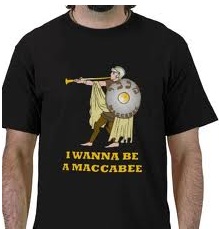Hanukah is probably the most confounding holiday on the Jewish calendar. If we move beyond the toys and the gelt of 20th century Christmas catch-up, the story itself has been interpreted in so many ways that it’s difficult to get a lock on the pshat (the simplest understanding).
For what is Hanukah? Is it the tale of a miraculous jug of oil that lasted for eight days, which today is commemorated in our lighting the candles on the hanukiah (the Hanukah menorah)? Or is it an historical account of a great military victory reestablishing, however briefly, Jewish sovereignty in our ancient land?
The answer is both…and neither.
It was “parent’s night” at the mechina (the pre-army seminary) where our daughter is spending a year before being drafted; a year of studying, volunteering and learning to get along with a group of forty other 18-year-olds (I wrote about it here). Part of the evening included a parent-child activity where we read selections from the first and second books of Maccabees, the two primary Biblical-era texts that refer to Hanukah (but which did not make it into the Hebrew canon).
The books present very different messages from the holiday. In First Maccabees, written about 40 years after the event itself by someone who presumably participated in one way or another, there is no mention of that universally known jug of oil at all; it’s all about the rebellion against the idolatrous Greeks and their assimilated Hellenistic Jewish wannabes. The second book, written 100 years after the first, downplays the military success and introduces the oil with an emphasis on God and miracles.
Historically, the attempt by the rabbis of the Talmud to sideline the fighting narrative makes sense, explained the head of our daughter’s mechina. There was at the time both a struggle between the rabbinic and priestly leaders for ascendency (the Maccabees were priests), and a desire to caution against military hubris (while the Maccabean revolt was successful, the next Jewish rebellions led to both the destruction of the Temple and the expulsion of the Jews from most of the land of Israel, definitely not events to emulate).
Seemingly ignoring the historical post-rebellion fall out, modern Zionists have eagerly adopted the holiday as emblematic of the brave fighters who liberated the land in our days. Whether that represents a miracle depends on one’s political and religious orientation. But there is no lack of Maccabean symbolism: many of our sport teams are named Maccabi and, in a striking irony, so is the Israeli version of that greatest representation of Greek culture the Olympics (dubbed the Maccabiah Games).
But there’s a darker side to the Hasmonean era military victory that tends to be whitewashed. The Maccabees were religious extremists; their goal was to rid the country of not only its Greek overloads but to compel the overwhelmingly secular Jewish population to adopt more stringent religious practices. Anshel Pfeffer, in this weekend’s Haaretz cites the late Christopher Hitchens as referring to the Maccabees as “bloodthirsty religious fundamentalists.”
Clearly over the top, but that interpretation seems chillingly appropriate this Hanukah as modern day extremists are once again bent on imposing their rigid agenda on the wider population. Open any Israeli newspaper in the last two weeks and it’s all over the front page: – from coerced separation between men and women on buses and sidewalks, to the removal of women’s images on outdoor advertising in Jerusalem, to the truly horrendous verbal and spitting attacks on an eight-year-old girl for “lack of modesty” revealed during a weekend TV news show. And don’t even get me started about what’s going on with the “price tag” burning of mosques, unprovoked uprooting of Palestinian olive trees, and now even Jewish attacks on Israeli army bases.
Is this what the pioneers intended when they adopted the symbol of the Maccabees as their own?
Perhaps what we need today is to look at the story truthfully and learn from it with eyes wide open. To quote from Spiderman, “with great power comes great responsibility.” Religious power without accountability, without compassion and tolerance, necessarily leads to corruption (as happened, by the way, to the original Maccabees once they assumed the throne in ancient Judea).
The time has come to meld the two books of the Maccabees. Let us focus on light – the key symbol from the second book – as a metaphor for clarity; for the kind of clear thinking that can temper the violence of the first book. It’s as critical today as it was then. That would be a true Hanukah miracle for our times.
I ranted yesterday about Hanukah on Israelity.



{ 1 comment… read it below or add one }
Thanks for sharing!